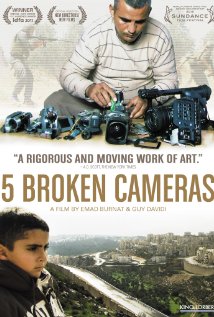
5 BROKEN CAMERAS
Palestine/Israel/Netherlands/friends, 2011, 94 minutes, Colour.
Emad Burnat and his family.
Directed by Emad Burnat, Guy Davidi.
5 Broken Cameras is a striking documentary, capturing the years 2005-2010 in Palestine, the aftermath of intifada, the experience of occupation, the experience of fences and checkpoints leading to the building of the separating wall.
The film received an Oscar nomination the best documentary and won an international Emmy. It received many nominations including from the Israeli film Institute and won awards in a variety of festivals ranging from Durbin, Milwaukee, Prague, Pusan, Taiwan, the Hague, Yerevan and the Sundance Festival.
The film was the work of Emad Burnat who experienced life in the occupied territories and decided at the time of the birth of his son to get a camera and photograph what was happening. The title indicates that his camera was broken, destroyed, several times so that in all he used five cameras.
While the film gives a vivid portrait of his family, his children, his wife and her generation as well as the grandparent generations, it is also a document in images of what was happening, the protests of the local villagers and the response of the Israeli authorities and military.
Audiences need films of this kind. While powerbrokers and governments discuss possible solutions, years pass and this film recounts the lives of ordinary people over a period of five years in the struggle for some kind of peace in Israel and Palestine.
1. Audience interest in, attitudes towards, responses to the life of the Palestinians, the role of the Israelis, separation, occupation, the wall, and apartheid? Conflict and peace?
2. The work of the director, his succession of cameras, his continued filming, the idea, to persevere even when the cameras were destroyed, photographing again and again?
3. The style of individual observation, of her movies? The footage of Gaza, of Israel, of protests, of the soldiers, the violence?
4. The small Palestinian town, the place of the settlements? Local protest, Israeli reactions, stances of non-violence, violence? The deaths? The claims, the land, the people? The children? The years and the arguments over the claim?
5. The film as a symbol of life, protest, the search for justice?
6. Walls, fences and gates, checkpoints – leading to the building of the wall? The land claims, pre-1948, post 1948, from 1967…?
7. The director and his family, information about them, the personal perspective he brings, his wife, the birth of the children, the range of children, the parent generation, the grandparents? The 1990s, better times, the later intifada? The baby born in 2005, the film representing the first five years of his life?
8. 2005 to 2010, the continuation? The decision to keep on filming? Israelis, the shootings, the oppression?
9. The range of people in the village, their stances? The children and their placard about letting them sleep?
10. The personality of the director, as a father, husband, patriot, concerned, cameraman, his son growing up, and the film as a record of his life, his family and the times?
11. The film as a contribution to audience awareness – but situation still continuing?